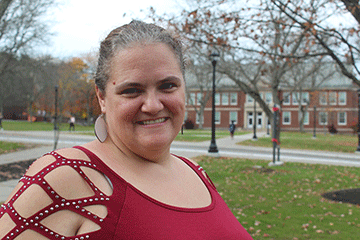Bulletin News

11/14/2022
Gina Williams has waited 20 years to finish college. So perhaps it’s not so surprising that she found her way to SUNY Cortland in the footsteps of her 10-years younger sister, Araistina Rumsey ’18.
But like the rest of the university’s approximately 225 non-traditional students, the junior dual history and archeology major from Dryden, N.Y., doesn’t follow the beaten path.
“I went to Onondaga Community College right out of high school, but then I got pregnant with my first daughter,” said Williams, now a married mother of five, including two stepchildren. “I attempted some online college over the years, but nothing panned out.”
As a single mother until nine years ago, for years she took any job she could to pay the bills. When the pandemic closed the café in Ithaca where she worked, Williams decided to finish her education.
But what to study?
Her drive to satisfy her curiosity about the origin of things settled her decision.
Williams recalled years of looking up at a striking, black-and-white photo of her paternal grandfather, Melvin Jackson Scholes Sr., as a U.S. World War II military servicemember. He walked down a street against a backdrop of total destruction at an atomic bomb site in either Hiroshima or Nagasaki, Japan, she’s not sure which.
“I’ve always been fascinated with how things came about, trying to understand where I came from,” said Williams, who has recently begun exploring a family line of Blackfoot ancestry living in upstate New York.
“I want to know the past, how I came to be here. The only way I know how is to try to understand the different cultures, the different time, what it was like back then.”
On one family genealogical website, the Groton, N.Y., native found that one great-great grandfather arrived in America in 1889, on a ship called Majestic, captained by Edward J. Smith 17 years before he set off at the helm of the ill-fated Titanic.
She is concentrating in world archeology.
“I’ve always loved Celtic, Irish, ancient Egyptian culture,” she said. “Just trying find my place in the world, I guess.”
At Cortland, Williams was inducted into the national honor society in history Phi Alpha Theta and, last semester, co-founded the university’s Archeology Club, which this semester gained recognition by the Student Government Association. She served briefly as its first treasurer, until life intervened again.
Williams loves learning, but that must always occur against a backdrop of raising two teenagers at home, ages 17 and 14, who look to her as a cheerleading coach; and keeping tabs on her fledged oldest child, 19, and two stepchildren, 19 and 16. Then there’s her extended local family of some 300 to 400 cousins and other area relatives to consider. She’s recently relocated her household from Groton while taking in her ill stepmother. Plus in the household she supports her husband, Matthew, in their six years of married life.
Williams does find time to contemplate her plans for after graduation.
“There’s a master’s program in archeology at Binghamton University,” she said. “Or I could see going to work for a museum as an archivist. You get to see all the stuff that’s hidden away from everybody, touch something that hasn’t been touched in thousands of years. That’s the draw toward the archeological side of it. You have to understand the history to understand the meaning of all the (museum) items.”
The university defines its non-traditional students as undergraduate students who are 24 years of age or older or, regardless of age, may have dependent children, be working full-time, have military experience or have made a break in education at some point after high school.
The university will acknowledge these individuals Monday, Nov. 14, through Friday, Nov. 18, during its celebration of Non-Traditional Students Week.
Stories about outstanding non-traditional students will be shared during the week. The week also includes a host of special activities, both on campus and virtually.

